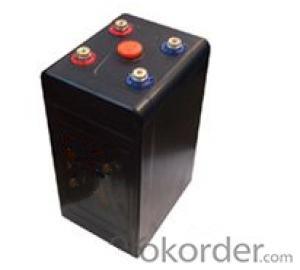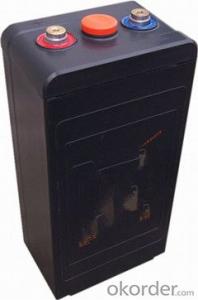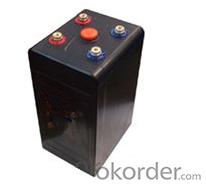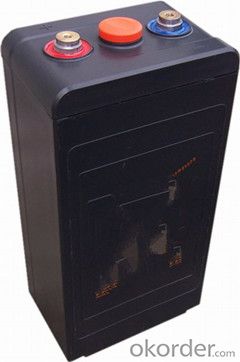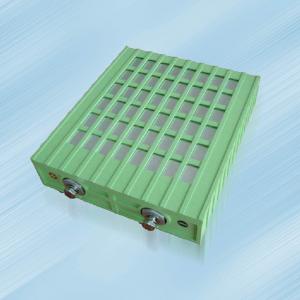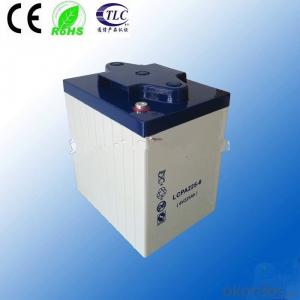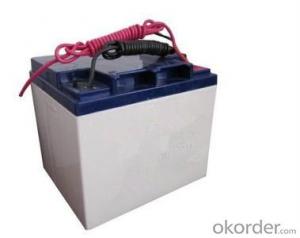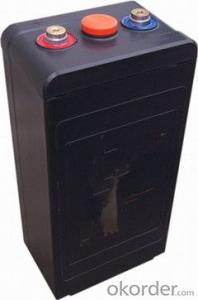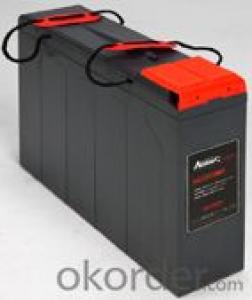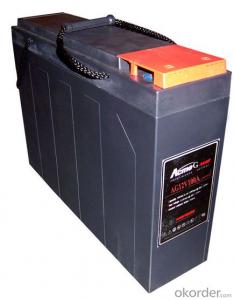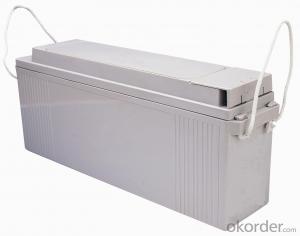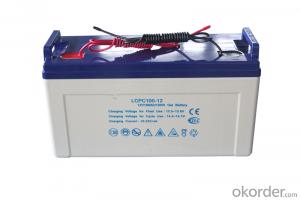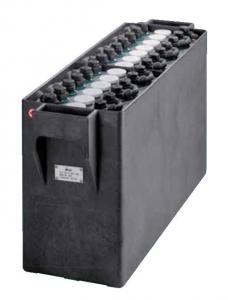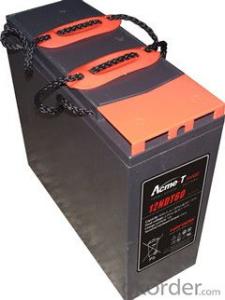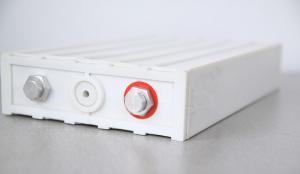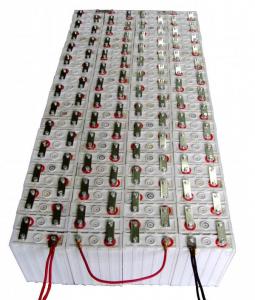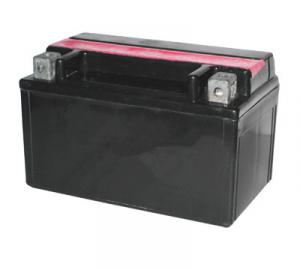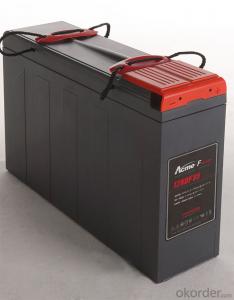battery the EosG series batteries EosG1000
- Loading Port:
- Shanghai
- Payment Terms:
- TT OR LC
- Min Order Qty:
- 2000 unit
- Supply Capability:
- 3000000 unit/month
OKorder Service Pledge
OKorder Financial Service
You Might Also Like
Range summary
The EosG range of gel technology batteries offers outstanding performance including a 15+ years design life .
The EosG series batteries is designed based on the Eos series.
Using the polymer gel electrolyte .
Built to the highest standards and compliant with the latest IEC60896-21/22 standard .
This range also offers 100% capacity out-of-the-box and is capable of handling deep discharges for complete peace of mind. The use of flexible connectors and the ability to be installed both horizontally and vertically allows for multiple installation possibilities.
Technical features
Above 15 years designed life
Reliable post sealing structure
Excellent charging acceptant ability
Excellent performance at extreme high and low temperature
Low self-discharge ability
Flexible and convenient installation with slinky outside looking
Type: | EosG1000 | |
Voltage: | 2V | |
Nominal Capacity: | 1000Ah(C10) | 1000Ah(10 hours rate:) |
Length: | 186mm | |
Width: | 229mm | |
Height: | 555mm | |
Height with termial: | 566mm | |
Weight: | 62.8Kg |
Compliant standards
IEC60896-21/22
BS6290 part 4
Telcordia SR4228
Eurobat guide
UL
Manufactured under system ISO9001(TUV)
EN 50272-2 or local equivalents
Correspondence exchange and transmission system
Mobile communication system
Power plant and power transformer system
Navigation and signaling system
Solar energy system
Radio and broadcasting station
Emergency lighting system
Plate special patent calcium and tin lead alloy and thick plate design
Container ABS(V0 optional)
Separator AGM
Valve EPDR
Electrolyte using the polymer gel electrolyte
Terminal M8 copper core posts
Battery installation compliant with:
Main applications
Products characteristics:
FAQ
![]() What is sulfation of batteries?
What is sulfation of batteries?
Sulfation is the formation or deposit of lead sulfate on the surface and in the pores of the active material of the batteries' lead plates. If the sulfation becomes excessive and forms large crystals on the plates, the battery will not operate efficiently and may not work at all. Common causes of battery sulfation are standing a long time in a discharged condition, operating at excessive temperatures, and prolonged under or over charging.
![]() How long a battery can last?
How long a battery can last?
The service design life of a battery are vary considerably with how it is used, how it is maintained and charged, temperature, and other factors.
![]() Do batteries self-discharge when not in use?
Do batteries self-discharge when not in use?
All batteries, regardless of their chemistry, self-discharge. The rate of self-discharge depends both on the type of battery and the storage temperature the batteries are exposed to. However, for a good estimate, Narada batteries self-discharge approximately 4% per week at 80ĄăF.
- Q: How to repair the battery?
- Connect the positive and negative output of the repair instrument to the positive and negative pole of the battery, open the repair instrument, repair the battery. The first repair time should be no less than 48 hours.
- Q: What is the difference between a maintenance-free battery and a conventional battery?
- Different materials will produce a different phenomenon: the traditional battery in the course of the use of the phenomenon of liquid reduction occurs, because the antimony on the grid will pollute the sponge on the negative plate of pure lead, weakened after the full charge of the battery Electromotive force, resulting in excessive decomposition of water, a large number of oxygen and hydrogen, respectively, from the positive and negative plates to escape, so that the electrolyte reduced. With calcium instead of antimony, you can change the fully charged battery back electromotive force, reduce the overcharge current, liquid gasification rate decreases, thereby reducing the loss of electrolyte.
- Q: What are the hazards of battery over discharge?
- Crystalline conductivity is poor, and bulky, will clog the pores of the battery plate, affecting the battery electrolyte penetration and exchange, but also further increase the battery resistance, a long time will prevent the battery power and chemical energy Of the reversible conversion, resulting in poor recovery of the battery charge, the battery was seriously damaged, or even unable to repair until scrapped.
- Q: What battery does the van use?
- General use of lead-acid batteries. Electrode is mainly made of lead and its oxide, the electrolyte is a sulfuric acid solution of a battery. English: Lead-acid battery Discharge state, the main component of the cathode is lead dioxide, the main component of the negative lead; charge state, the main components of the positive and negative are lead sulfate. Divided into exhausted batteries and maintenance-free lead-acid batteries.
- Q: What is the meaning of the battery above 12v65Ah?
- 12V represents the rated voltage. 65Ah indicates that the battery capacity (ie 1 ampere current can be used for 65 hours).
- Q: 80ah how much battery storage capacity?
- Is 80AH. Understood to discharge at 80 amps for about 1 hour (but not to say that after 1 hour is finished, there is still electricity). In theory, this is your battery power.
- Q: The role of the battery?
- Battery is widely used, can be used for ups, electric cars, scooters, cars, wind energy solar systems, security, and so on.
- Q: What kind of battery is divided into?
- Ordinary battery: ordinary battery plate is composed of lead and lead oxide, the electrolyte is sulfuric acid aqueous solution. Its main advantage is the voltage stability, the price is cheap.
- Q: Battery 200ah / 104 what does that mean?
- 2V battery capacity (from 200AH-3000AH have) long design, good stability, the price is also expensive; 12V battery capacity is generally the largest 250AH, design life as 2V, price economy, high current discharge better.
- Q: How does battery activation work?
- Always keep the battery surface clean. Found that the surface of dust and acid, it should be timely wipe, wipe can be wiped with soda water wipes wipe again, after rinse with water.
Send your message to us
battery the EosG series batteries EosG1000
- Loading Port:
- Shanghai
- Payment Terms:
- TT OR LC
- Min Order Qty:
- 2000 unit
- Supply Capability:
- 3000000 unit/month
OKorder Service Pledge
OKorder Financial Service
Similar products
Hot products
Hot Searches
Related keywords
